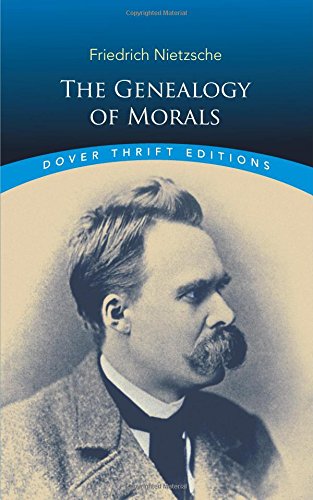We spent many hours on research to finding genealogy of morals, reading product features, product specifications for this guide. For those of you who wish to the best genealogy of morals, you should not miss this article. genealogy of morals coming in a variety of types but also different price range. The following is the top 9 genealogy of morals by our suggestions:
Reviews
1. Nietzsche: 'On the Genealogy of Morality' and Other Writings: Revised Student Edition (Cambridge Texts in the History of Political Thought)
Feature
Used Book in Good ConditionDescription
Friedrich Nietzsche is one of the most influential thinkers of the past 150 years and On the Genealogy of Morality (1887) is his most important work on ethics and politics. A polemical contribution to moral and political theory, it offers a critique of moral values and traces the historical evolution of concepts such as guilt, conscience, responsibility, law and justice. This is a revised and updated 2006 edition of one of the most successful volumes to appear in Cambridge Texts in the History of Political Thought. Keith Ansell-Pearson modified his introduction to Nietzsche's classic text, and Carol Diethe incorporated a number of changes to the translation itself, reflecting the considerable advances in our understanding of Nietzsche. In this guise the Cambridge Texts edition of Nietzsche's Genealogy should continue to enjoy widespread adoption, at both undergraduate and graduate level.2. The Genealogy of Morals (Dover Thrift Editions)
Feature
The Genealogy of Morals Dover Thrift EditionsDescription
Written in response to a book on the origins of morality by his erstwhile friend Paul Re, the three essays comprising The Genealogy of Morals all three advancing the critique of Christian morality set forth in Beyond Good and Evil are among Nietzsche's most sustained and cohesive work.
In the first essay starting from a linguistic analysis of words such as "good," "bad," and "evil" Nietzsche sets up a contrast between what he calls "master" morality and "slave" morality and shows how strength and action have often been replaced by passivity and nihilism. The next essay, looking into the origins of guilt and punishment, shows how the concept of justice was born and how internalization of this concept led to the development of what people called "the soul." In the third essay, Nietzsche dissects the meaning of ascetic ideals.
It is not Nietzsche's intention to reject ascetic ideals, "slave" morality, or internalized values out of hand; his main concern is to show that culture and morality, rather than being eternal verities, are human-made. Whether or not you agree with all of his conclusions, his writing is of such clarity and brilliance that you will find reading The Genealogy of Morals nothing short of exhilarating.
3. On the Genealogy of Morals and Ecce Homo
Feature
VintageDescription
The great philosopher's major work on ethics, along with Ecce Homo, Nietzche's remarkable review of his life and works. On the Genealogy of Morals (1887) shows him using philsophy, psychology, and classical philology in an effort to give new direction to an ancient discipline.The work consists of three essays. The first contrasts master morality and slave morality and indicates how the term "good" has widely different meanings in each. The second inquiry deals with guilt and the bad conscience; the third with ascetic idealsnot only in religion but also in the academy.
Ecce Homo, written in 1898 and first published posthumously in 1908, is Nietzsche's review of his life and works. It contains chapters on all the books he himself published. His interpretations are as fascinating as they are invaluable. Nothing Nietzsche wrote is more stunning stylistically or as a human document.
Walter Kaufmann's masterful translations are faithful of the word and spirit of Nietzsche, and his running footnote commentaries on both books are more comprehensive than those in his other Nietzsche translations because these tow works have been so widely misunderstood.
4. On the Genealogy of Morals (Oxford World's Classics)
Feature
On the Genealogy of Morals A Polemic By Way of Clarification and Supplement to My Last Book Beyond Good and EvilDescription
On the Genealogy of Morals (1887) is a book about interpretation and the history of ethics which raises profoundly disquieting issues about the violence of both. This is the most sustained of Nietzsche's later works and offers one of the fullest expressions of his characteristic concerns. The introduction places his ideas within the cultural context of his own time and stresses the relevance of his work for a contemporary audience.About the Series: For over 100 years Oxford World's Classics has made available the broadest spectrum of literature from around the globe. Each affordable volume reflects Oxford's commitment to scholarship, providing the most accurate text plus a wealth of other valuable features, including expert introductions by leading authorities, voluminous notes to clarify the text, up-to-date bibliographies for further study, and much more.
5. On the Genealogy of Morals (Penguin Classics)
Feature
Penguin ClassicsDescription
For the first time in Penguin Classics: Nietzsches accessible exploration of key ideas in his landmark Beyond Good and Evilin a lucid new translationFriedrich Nietzsche claimed that the purpose of On the Genealogy of Morals was to call attention to his previous writings. But in fact the book does much more than that, elucidating and expanding on the cryptic aphorisms of Beyond Good and Evil, and presenting a coherent discussion of morality in a work that is more accessible than much of his previous writings.
For more than sixty-five years, Penguin has been the leading publisher of classic literature in the English-speaking world. With more than 1,500titles, Penguin Classics represents a global bookshelf of the best works throughout history and across genres and disciplines. Readers trust theseries to provide authoritative texts enhanced by introductions and notes by distinguished scholars and contemporary authors, as well as up-to-datetranslations by award-winning translators.
6. On the Genealogy of Morality
Feature
Used Book in Good ConditionDescription
This new edition is the product of a collaboration between a Germanist and a philosopher who is also a Nietzsche scholar. The translation strives not only to communicate a sense of Nietzsches style but also to convey his meaning accuratelyand thus to be an important advance on previous translations of this work. A superb set of notes ensures that Clark and Swensen's Genealogy will become the new edition of choice for classroom use.
7. The Birth of Tragedy & The Genealogy of Morals
Description
Skillful, sophisticated translations of two of Nietzsche's essential works about the conflict between the moral and aesthetic approaches to life, the impact of Christianity on human values, the meaning of science, the contrast between the Apollonian and Dionysian spirits, and other themes central to his thinking.The Birth of Tragedy (1872) was Nietzsche's first book, The Geneology of Morals (1887) one of his last. Though they span the career of this controversial genius, both address the problems such as the conflict between the moral versus aesthetic approaches to life, the effect of Christianity on human values, the meaning of science, and the famous dichotomy between the Apollonian and Dionysian spirits, among many themes which Nietzsche struggled throughout his tortured life.
8. The Genealogy of Morals (Translated by Horace B. Samuel with an Introduction by Willard Huntington Wright)
Description
German philosopher, Friedrich Nietzsche was one the most controversial figures of the 19th century. His evocative writings on religion, morality, culture, philosophy, and science were often polemic attacks against the established views of his time. First published in 1887, The Genealogy of Morals, is a work which follows and expands upon the principles of his previous works, Thus Spoke Zarathustra and Beyond Good and Evil. In a preface and three interrelated essays, Nietzsche outlines his theories on the origins of our moral prejudices. The Genealogy of Morals, was written partly in response to his friend Paul Re's book The Origin of the Moral Sensations, whose genealogical hypothesis of morality he found unsatisfactory. Nietzsche begins by reiterating in his first essay the historical conflict between socio-economic classes that has given rise to the varying definitions of good and evil. In the second essay, Nietzsche discusses the origins of the institution of punishment, asserting that it arises from a straightforward relationship between creditors and debtors. Lastly, in the third essay, the philosopher considers the meaning of ascetic ideals. A classic work of moral philosophy, The Genealogy of Morals is considered by many as one of Nietzsches finest. This edition is printed on premium acid-free paper, follows the translation of Horace B. Samuel, and includes an introduction by Willard Huntington Wright.9. Nietzsche: On the Genealogy of Morality and Other Writings (Cambridge Texts in the History of Political Thought)














